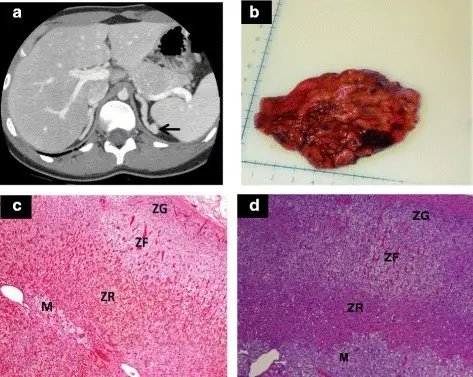Congenital adrenal hyperplasia is an inherited disorder that is characterized by enlargement of the adrenal glands due to excessive secretion of androgenic hormones by the adrenal cortex.
What is the Pathology of Congenital Adrenal Hyperplasia?
The pathology of congenital adrenal hyperplasia is:
-Etiology: The cause of congenital adrenal hyperplasia is any of several mutations in the genes that code specialized enzymes that are involved in the production of cortisol and steroids by the adrenal glands.
-Pathogenesis: The sequence of events that lead to congenital adrenal hyperplasia involve deficiency or absence of a single enzyme. 21-hydroxylase deficiency is the most common cause.
-Morphology: The morphology associated with congenital adrenal hyperplasia shows a decrease in cortisol production. As a consequence, there is a compensatory increase in the secretion of adrenocorticotropin from the pituitary gland.
-Histology: The histology associated with congenital adrenal hyperplasia shows benign hyperplastic adrenal tissue changes.
How does Congenital Adrenal Hyperplasia Present?
Patients with congenital adrenal hyperplasia may be male or female present infants or young children. The symptoms, features, and clinical findings associated with congenital adrenal hyperplasia include that excess androgen production, low blood pressure, facial hair, abnormal heart rates, and skin changes.
How is Congenital Adrenal Hyperplasia Diagnosed?
Congenital adrenal hyperplasia is diagnosed with imaging tests and enzymatic analysis particularly looking for abnormalities in enzymes involved with steroidogenesis, especially 21-hydroxylase.
How is Congenital Adrenal Hyperplasia Treated?
Congenital adrenal hyperplasia is treated with cortisol or a synthetic hormone treatment. Prednisone or dexamethasone may also be useful.
What is the Prognosis of Congenital Adrenal Hyperplasia?
The prognosis of congenital adrenal hyperplasia is fair.



